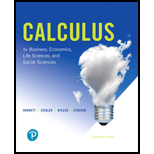
Concept explainers
Future value. At the end of each year, $5,000 is invested into an IRA earning 3% compounded annually.
- (A) How much will be in the account at the end of 30 years? Use the annuity formula
where
P = periodic payment
i = rate per period
n = number of payments (periods)
F = FV = future value
 (B) Use graphical approximation methods to determine the rate of interest that would produce $300,000 in the account at the end of 30 years.
(B) Use graphical approximation methods to determine the rate of interest that would produce $300,000 in the account at the end of 30 years.
Want to see the full answer?
Check out a sample textbook solution
Chapter 7 Solutions
Pearson eText for Calculus for Business, Economics, Life Sciences, and Social Sciences -- Instant Access (Pearson+)
- +6x²+135x+1) (0≤x≤10). a) Find the number of units The total profit P(x) (in thousands of dollars) from a sale of x thousand units of a new product is given by P(x) = In (-x²+6x² + 135x+ that should be sold in order to maximize the total profit. b) What is the maximum profit?arrow_forwardNsjsjsjarrow_forwardlog (6x+5)-log 3 = log 2 - log xarrow_forward
- 1 The ratio of Argan to Potassium from a sample found sample found in Canada is .195 Find The estimated age of the sample A In (1+8.33 (+)) t = (1-26 × 109) en (1 In aarrow_forward7. Find the doubling time of an investment earning 2.5% interest compounded a) semiannually b) continuouslyarrow_forward6. Find the time it will take $1000 to grow to $5000 at an interest rate of 3.5% if the interest is compounded a) quarterly b) continuouslyarrow_forward
- A smallish urn contains 16 small plastic bunnies - 9 of which are pink and 7 of which are white. 10 bunnies are drawn from the urn at random with replacement, and X is the number of pink bunnies that are drawn. (a) P(X=6)[Select] (b) P(X>7) ≈ [Select]arrow_forward. Find how many years it takes for $1786 to grow to $2063 if invested at 2.6% annual interest compounded monthly. 12+arrow_forwardK=3, Gauss Seidel Fill in only 4 decimal places here in Canvas. Make sure in exam and homework, 6 decimal places are required. X1 = X2 = X3 =arrow_forward
- A smallish urn contains 25 small plastic bunnies - 7 of which are pink and 18 of which are white. 10 bunnies are drawn from the urn at random with replacement, and X is the number of pink bunnies that are drawn. (a) P(X = 5)=[Select] (b) P(X<6) [Select]arrow_forwardThe fox population in a certain region has an annual growth rate of 8 percent per year. It is estimated that the population in the year 2000 was 22600. (a) Find a function that models the population t years after 2000 (t = 0 for 2000). Your answer is P(t) = (b) Use the function from part (a) to estimate the fox population in the year 2008. Your answer is (the answer should be an integer)arrow_forwardrarrow_forward
 College AlgebraAlgebraISBN:9781305115545Author:James Stewart, Lothar Redlin, Saleem WatsonPublisher:Cengage Learning
College AlgebraAlgebraISBN:9781305115545Author:James Stewart, Lothar Redlin, Saleem WatsonPublisher:Cengage Learning

 Glencoe Algebra 1, Student Edition, 9780079039897...AlgebraISBN:9780079039897Author:CarterPublisher:McGraw HillAlgebra & Trigonometry with Analytic GeometryAlgebraISBN:9781133382119Author:SwokowskiPublisher:Cengage
Glencoe Algebra 1, Student Edition, 9780079039897...AlgebraISBN:9780079039897Author:CarterPublisher:McGraw HillAlgebra & Trigonometry with Analytic GeometryAlgebraISBN:9781133382119Author:SwokowskiPublisher:Cengage Algebra and Trigonometry (MindTap Course List)AlgebraISBN:9781305071742Author:James Stewart, Lothar Redlin, Saleem WatsonPublisher:Cengage Learning
Algebra and Trigonometry (MindTap Course List)AlgebraISBN:9781305071742Author:James Stewart, Lothar Redlin, Saleem WatsonPublisher:Cengage Learning





